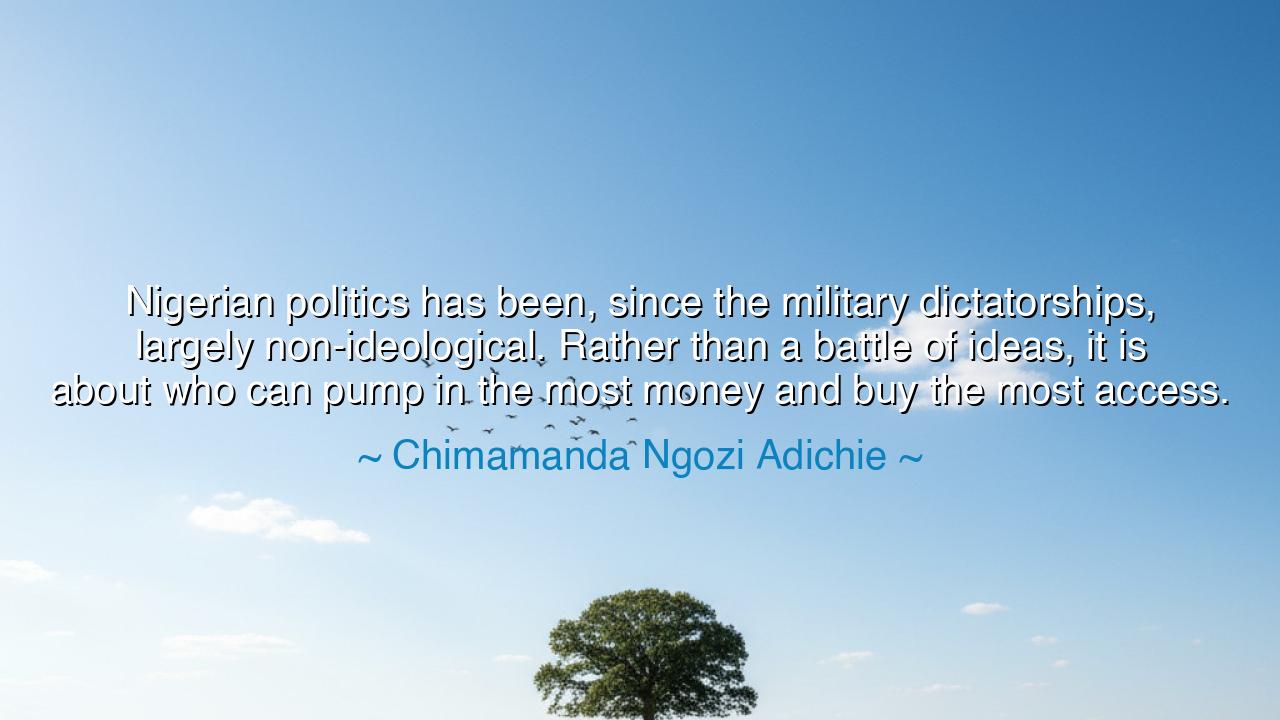
Nigerian politics has been, since the military dictatorships
Nigerian politics has been, since the military dictatorships, largely non-ideological. Rather than a battle of ideas, it is about who can pump in the most money and buy the most access.






O children of the future, hear the words of Chimamanda Ngozi Adichie, who, with piercing clarity, speaks of the state of Nigerian politics in our time. "Nigerian politics has been, since the military dictatorships, largely non-ideological. Rather than a battle of ideas, it is about who can pump in the most money and buy the most access." In these words, she reveals the painful truth of a political system that has been corrupted by the forces of wealth and power, where the ideals that should guide a nation have been buried beneath the weight of those who can afford to buy influence. Adichie calls us to see a world where politics has become a game of riches, not ideals—a battle not for the heart of the people, but for the wallets of the few.
In the ancient world, Greece and Rome experienced similar struggles, where power often became a commodity traded not on the basis of noble ideals, but through bribes and alliances. In Rome, the rise of the Roman Empire was fueled not just by military conquest, but by the influence of the wealthy elite who used their riches to sway the masses and buy the loyalty of the ruling class. The Senate, once a place of ideas, became a forum for wealth and corruption, and the Republic crumbled as those who held power increasingly used their riches to silence voices of reason and justice. Adichie’s words remind us that when politics is shaped by the influence of money, the very soul of democracy is at risk.
The story of Alexander the Great offers another reflection on the dangers of political power being wielded by those with unchecked resources. Though Alexander was a brilliant strategist and warrior, his conquests were also financed by the wealth of those who supported him. In his empire-building, he found that while ideas of unity and vision could win wars, the support of the rich was often the decisive force in maintaining power. Adichie’s statement speaks to this timeless truth: without the guiding force of ideas, politics becomes the preserve of the wealthy few, those who can buy access to power and influence.
In more modern history, we see the same forces at play. Consider the rise of military dictatorships in Nigeria, where power was seized not through democratic means, but through the might of the military and the manipulation of resources. The lack of ideological foundation led to a system where money became the deciding factor, not ideas or principles. Adichie draws attention to the legacy of these regimes, where democracy itself has been hollowed out by the greed and manipulation of those in power, leaving the people to struggle for their voices in a system that thrives on access, not justice.
O children, let us heed Adichie’s warning. In a world where money determines access to power, the very principles of democracy and justice are at risk. As the ancients knew, true leadership is not born of wealth, but of wisdom, of ideas that serve the people, not the powerful few. Let us honor the ideas that shape a better world, and resist the temptation to fall into a system where wealth buys influence and truth is sold to the highest bidder. In this, we are reminded that the power of politics lies not in the hands of the wealthy, but in the hands of those who truly serve the common good—those who lead not with money, but with integrity and vision.






AAdministratorAdministrator
Welcome, honored guests. Please leave a comment, we will respond soon